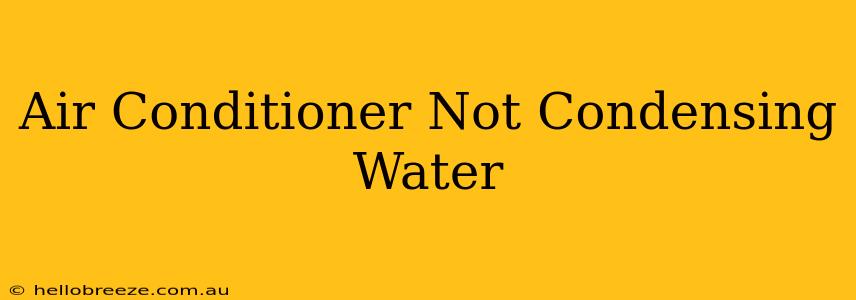Is your air conditioner running but not producing condensation? This is a serious issue that needs immediate attention. A lack of condensation often indicates a problem that could lead to costly repairs down the line or even system failure. This comprehensive guide will walk you through the common causes of this problem and provide effective solutions. Let's dive in!
Understanding Air Conditioner Condensation
Before we troubleshoot, let's understand the basics. Your air conditioner works by removing heat and humidity from the air. This process involves refrigerant circulating through the system, absorbing heat, and then releasing it outside. This heat release causes the refrigerant to condense, forming water which is usually drained away. When this process malfunctions, you’ll notice a lack of water condensation.
Common Reasons Why Your AC Isn't Condensing Water
Several factors can contribute to your air conditioner not producing condensation. Let's explore the most frequent culprits:
1. Low Refrigerant Levels: A Major Culprit
Low refrigerant is often the primary reason for insufficient condensation. Refrigerant is crucial for the heat absorption and release process. If levels are low, the system can't cool effectively, impacting condensation. Leaking refrigerant is a common issue, usually requiring professional repair and refrigerant recharge. This is not a DIY fix.
2. Clogged Drain Line: A Simple Fix (Sometimes)
A clogged drain line can prevent the condensed water from draining properly. Over time, dirt, algae, and other debris can accumulate, blocking the flow. Check your drain line (usually a small pipe connected to the air conditioner) for blockages. You might be able to clear a simple clog yourself using a long, thin brush or compressed air. However, if the clog is severe or you're uncomfortable, call an HVAC technician.
3. Frozen Evaporator Coil: A Serious Problem
A frozen evaporator coil is a significant issue that prevents proper heat exchange and, consequently, condensation. This often happens due to low refrigerant, restricted airflow, or a dirty air filter. A frozen coil is an indicator of a bigger problem and shouldn't be ignored.
4. Faulty Blower Motor: Affecting Air Circulation
A malfunctioning blower motor restricts the airflow across the evaporator coil. Without proper airflow, heat transfer is reduced, affecting condensation. This issue requires a professional inspection and possibly motor replacement.
5. Dirty Air Filter: A Simple, Often Overlooked Issue
A clogged or dirty air filter restricts airflow, similarly impacting the cooling process and reducing condensation. Replacing the air filter regularly is crucial for maintaining efficient operation. This is an easy, inexpensive DIY fix that should be done at least every 3 months, or more frequently depending on your usage and environment.
6. Problems with the Condenser Fan Motor: Essential for Heat Dissipation
The condenser fan motor is crucial for dissipating heat from the condenser coil. If this motor isn't working properly, the system can overheat, affecting its ability to condense water. A faulty motor often needs professional replacement.
What to Do If Your Air Conditioner Isn't Condensing Water
1. Check the Obvious: Begin by checking the simple things like the air filter and drain line. Replacing a dirty filter is a quick and easy first step.
2. Listen Carefully: Pay attention to any unusual noises from the AC unit. Unusual sounds could indicate a problem with the fan motors or other components.
3. Call a Professional: If you've checked the simple things and still have no condensation, it's time to call a qualified HVAC technician. Attempting complex repairs yourself can be dangerous and may void any warranties.
Preventing Future Condensation Problems
- Regular Maintenance: Schedule regular maintenance checks with an HVAC professional. This preventative maintenance can identify potential issues before they become major problems.
- Clean Air Filters Regularly: This is the simplest and most effective preventative measure.
- Keep the Unit Clean: Keep the outdoor unit free from debris and obstructions.
Ignoring a lack of condensation in your air conditioner can lead to more significant issues and expensive repairs. By understanding the potential causes and taking prompt action, you can ensure your air conditioning system continues to run efficiently and effectively. Remember, when in doubt, call a professional!

